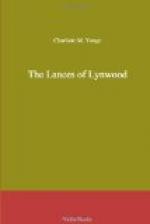“Throw her a gold piece, Sir Eustace, or she may cast at you an evil eye. There, you old hag,” he added in the Provencal patois, “take that, and thank your stars that ’tis not with a fire that your tender care, as you call it, is requited.”
The men-at-arms meditated ducking the witch after their own English fashion, but it was growing late and dark, and the Knight gave strict orders that they should keep together in their progress to their own tents. Here Leonard was deposited on the couch which Gaston insisted on giving up to him; but his change of residence appeared to be of little advantage, for the camp was scarce quiet for the night, before he shrieked out that the black cats were there. Neither Eustace nor Gaston could see them, but that was only a proof that they were not under the power of the enchantment, and John Ingram was quite sure that he had not only seen the sparkle of their fiery eyes, but felt the scratch of their talons, which struck him to the ground, with his foot caught in the rope of the tent, while he was walking about with his eyes shut.
The scratch was actually on his face the next morning, and he set out at the head of half the Lances of Lynwood to find the poor old woman, and visit her with condign punishment; but she was not forthcoming, and they were obliged to content themselves with burning her house, assisted by a host of idlers. In the meantime, Sir Eustace had called in the aid of the clergy: the chaplains of the camp came in procession, sprinkled the patient’s bed with holy water, and uttered an exorcism, but without availing to prevent a third visit from the enemy. After this, however, Leonard’s fever began to abate, and he ceased to be haunted.
He had been very ill; and, thoroughly alarmed, he thought himself dying, and bitterly did he repent of the headstrong insubordination and jealously which had lead him to quit his best and only friend. He had not, indeed, the refinement of feeling which would have made Eustace’s generosity his greatest reproach; he clung to him as his support, and received his attentions almost as a right; but still he was sensible that he had acted like a fool, and that such friendship was not to be thrown away; and when he began to recover he showed himself subdued, to a certain degree grateful, and decidedly less sullen and more amenable to authority.
In the meantime, the Prince of Wales found himself sufficiently recovered to undertake to return to Aquitaine, and, weary of the treacherous delays and flagrant crimes of his ally, he resolved to quit this fatal land of Castile.




